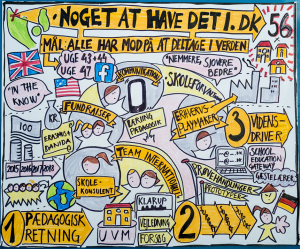 Internationalisation of education does not just have to happen at institutional level; it can happen at local government level and there was a wonderful example of this at the recent conference (in Danish) on internationalisation in Copenhagen last week. The municipality of Aalborg wants nothing less than to be the best place for education in Denmark and that means internationalising.
Internationalisation of education does not just have to happen at institutional level; it can happen at local government level and there was a wonderful example of this at the recent conference (in Danish) on internationalisation in Copenhagen last week. The municipality of Aalborg wants nothing less than to be the best place for education in Denmark and that means internationalising.
This affects all the schools in the catchment but it involves many other players too. The city of Aalborg is home to one of Denmark’s major universities and therefore that means attracting international students too. This regional policy means a tight collaboration with local businesses with global connections or businesses with global aspirations. If this sounds complicated then it probably is, but the graphic used during the session (included here) shows how intertwined internationalisation is with all aspects of life.
It starts in schools, continues to higher education and includes recruiting services and advice for businesses. There is also an impressive marketing strategy which includes bus adverts, good news stories on Facebook (to reach parents for example) and special internationalisation weeks in which special events are planned and delivered. The city council’s education department is very active in supporting schools through their staff and a very dynamic website Noget at Have Det i (in Danish) through which ideas such as having Chinese summer schools and bilingual education are offered.
One of the major aims in this relatively sparsely populated part of Denmark is to attract and retain an international and highly qualified workforce. This seems to be working and one major reason for this could be the holistic approach taken to the promotion of internationalisation. If you move your family to a new country, it’s not just about the job but also about work for your spouse, language learning, schooling for your children and accommodation to name just a few important factors. The main example of this joined-up thinking was the setting up of the International House (in English) of North Denmark which is meant to act as a one-stop shop for individuals and businesses thinking of moving to the area.
Aalborg’s ambition is large and funding for the myriad projects and different angles of their ambition does not come from just one source. When we look at what Aalborg is doing we have moved a long way from paying for an individual teacher to take a course elsewhere in Europe through the Erasmus programme. But it does show how comprehensive an internationalisation policy can be.